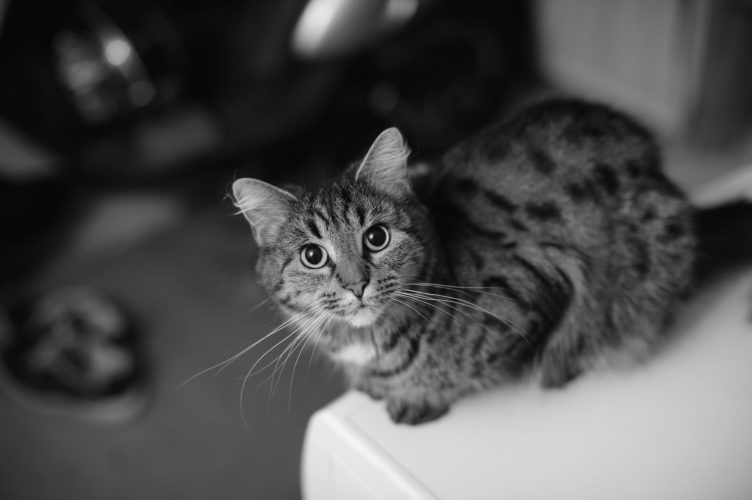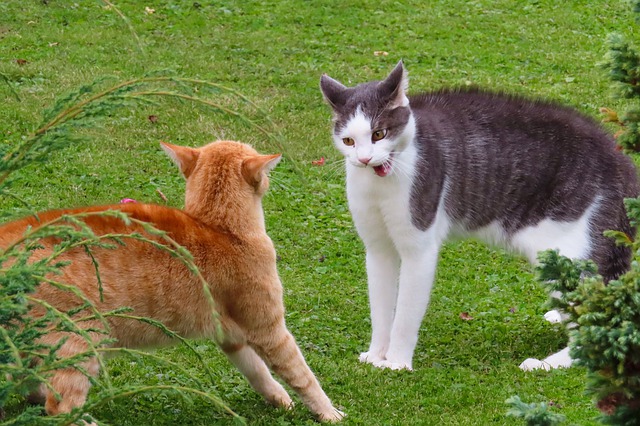Cat Anxiety Problems and Solutions
.
How to reduce cat anxiety: Summary
- Scaredy cats! Cat anxiety, fears and phobias can be helped by understanding the cause of your cat’s anxiety.
- Management of the cat anxiety issue involves providing the cat with a safe space, preferably up high.
- Long term solutions involve desensitising the cat to the anxiety-provoking issues. Medication may also help.
Causes of the cat anxiety problem
Cats can be confident creatures but at times they can be scaredy cats! Cat anxiety, fears and phobias can be helped with a little understanding, patience and a few tips on how to reduce cat anxiety…
Fear is a normal part of life but anxieties and phobias are not. Finding a solution to your cat’s fears requires understanding just what is causing them. Here are some common causes:
Negative experience
Most kittens and cats are willing to greet new experiences with a confident paw and innate curiosity. Most experiences turn out to be positive ones and the kitten is calm and accepting or playful and positive.
Occasionally, however, the experience turns out to be a negative one. Your kitten feels scared. If the fearful experience is repeated, or even if it is only experienced once but it extremely painful or fear-provoking, your kitten may learn to fear that stimulus.
No experience
Cats may be fearful of experiences that they encounter for the first time, especially if they have never encountered them when young. The new experience has them on edge, alert and perhaps ready to flee.
Your cat may be experiencing fear, anxiety or phobias to events that they have had little or no experience of in early life.
Cat anxiety can be shown to objects such as balloons, umbrellas or to events such as guest in your home.
Symptoms of the cat anxiety problem
Sleeping
Scared cats tend to sleep more than normal. Often owners miss this symptom, as cats sleep a lot when not stressed. Think of sleep as blocking out real life when stressed, Chronic stress may lead to health issues.
Hiding/Escaping
Fearful cats may hide from whatever is scaring them. If you find your cat under the bed or at the back of the cupboard when guests visit, your cat may be stressed. They may also try to escape outdoors.
Pacing/Crying
Some cats may pace around a window or doorway or meow loudly or mournfully when stressed. This may be in response to another cat nearby or on your departure, if they have separation anxiety.
Toileting
Anxious cats will often toilet around their area – your home. Their scent makes them feel more secure. It is important to reduce stress in these cats’ lives.

Read: Understanding cat emotions
Solutions for cat anxiety problem
Stress relief
Relocating your cat to a different area of your home may prevent their anxiety levels rising. For example, if your cat reacts to people entering your property, place them where they cannot encounter people.
Music may also help your cat. Studies show that cat’s calm down when played classical music.
Calming agents such as Feliway (cat appeasing pheromone) and veterinary medication may provide relief for your cat’s anxieties. Ask your vet.
Up High
One of the simplest ways you can calm a cat with cat anxiety is to give them spots up high to get away form the stressful situation. Clear shelves and window sills to give them spots to climb or jump up on to. When they are in these areas, they can watch and listen but not have to encounter the scary situation directly. This is far better than running away!
High areas are also good when you have to introduce your cat to a new experience. A visitor to your home or a new dog, for instance. If your cat can be up high, they can see, smell and listen to the newcomer without having to resort to escaping or hiding. They are learning that this new experience does not have to be a scary one.
Desensitisation
Long-term solutions for cat anxiety involve de-sensitising the cat to the situations that they fear. This needs to be carried out gradually and very carefully, going at the cat’s pace. It is suggested that professional help be used.
If you cat was scared of your visitors to your home, for example, you might begin by bringing the scent of other people into your home and letting the cat sniff this. This could be done by bringing a blanket, a sweater or a suitcase. You would offer the cat praise, pats or something tasty for remaining calm.
You might also play sounds of people to your cat, long before you introduce them to the actual people. carry on with gradual introductions to desensitise your cat.
Separation anxiety
If your cat dislikes being left alone, try some gradual separations from them within your home. Build up the time apart gradually and make time alone positive by leaving food and toys. More about separation anxiety here.

Anxiety and Aggression Towards other Cats
Cats generally dislike other cats that they do not know. For owners this usually happens due to two situations:
- A neighbour’s cat is stressing yours by entering your garden
- You introduce a new cat into your household and your cat does not like it
Understanding the anxiety at other cats problem
It is not normal to share your resources with strange cats. Most groups of cats that live together are from the same family. Humans alter this natural arrangement by introducing other, unknown felines or by living next to other pet-owning families.
The best way to ensure that your cat is friendly towards other cats is to socialise them with lots of different cats when they are kittens. This must be done in a careful and controlled manner with minimal disease risk. Kitten classes, although fairly rare, can be a good method of socialising your cat in addition to learning about cats in general.
Many owners however, understandably, do not continue the socialisation process throughout their cat’s life. Thus their cat gets stressed when forced to encounter another neighbourhood feline or to have to live alongside an introduced one.
If your cat is stressing at a neighbourhood cat, then you may find them trying to get out more often or, more likely, trying to stay at home. This means that instead of toileting outdoors, they urinate and defecate inside or they spray up against doors and windows, areas that are closest to the intruder. They may also vocalise excessively and hide.
When you bring a new cat home, fur and hisses may fly for a while but generally, cats get used to one another. Kittens are often more readily accepted than older cats but all introductions need patience.
Read more about cat aggression
Solutions to the anxiety at other cats problem
Long-term solutions to anxiety towards cats
Prevention is better than a cure for cats who are anxious at other cats. If you are planning to bring another feline friend into your life, ensure you can keep your cats separate for the first few days. Then transfer scents, blankets etc, from one room to another. Use a cat carrying case for one cat while the other explores the room, then swap. Allow the cats to watch one another from a distance.
Kittens can be too energetic for older cats so if your youngster is annoying your existing cat, it is time for you to step in and provide more appropriate forms of entertainment. Ensure that both cats have enough stimulation in their lives in the form of happy home activities.
If your cats still do not get along after some time together you may need to gradually desensitise them by re-introducing them in a very careful and controlled manner.
If your cat reacts to other cats in the neighbourhood, you may need to change your routines, by keeping your cat indoors or in a different area of your home or garden. Veterinary medication such as Feliway may help and you may need to ask your neighbours to keep their cat on their own property.
Short-term solutions to anxiety towards cats
In the short term, management techniques such as separating cats to different areas of your home may help diffuse the situation. When they are together, have areas that your cats can get up high to feel safe. Home remedies such as lavender or rescue remedy may help.
Frequently asked questions about cat anxiety
Why is my cat scared of my boyfriend?
Cats may be scared of new or unusual experiences. Try getting your smell over your boyfriend via a rug, and ask your boyfriend not to make sudden movements or loud noises until your cat gets used to them. Watch our video below.
Why is my cat afraid of me sometimes?
Your cat may become scared of you if you behave differently. Perhaps you are louder or faster than you usually are or you have returned with a strange scent on you. Get them used to these changes gradually.
Why does my cat cry in the car?
Your cat is likely anxious about travel in the car. You should try some short outings, starting with taking your cat out to your car in their carry case, but not going anywhere. Gradually build up trips and make sure that you are not only going to the vet!
More helpful info
8 Signs your cat might be suffering from stress
Anxiety in dogs
Grooming tips
From the Fancy Feast Lounge…
Ask Dr Jo: How can I tell if my cat is anxious?
Many people don’t even realise that their cat is anxious. Perhaps because their cat hides away! If you think your cat could be a scaredy cat, here are some of the ways that you can tell your cat might be stressed. And also some tips for what to do about it.
More cat behaviours explained
- Pets and water sprays: No way!Pets and water sprays People often tell me that they use a water spray to correct their pet’s behaviour. They say it works,
- Cats use of litter box is determined by sight, not scentCats use of litter box determined by sight, not scent You might think your cat’s litter box is clean , even if they
- How to Keep Pets Calm in Stressful SituationsAll pets get stressed at times and some are in a constant state of anxiety, so it helps to know how to keep
- Australia’s cats kill 650 million reptiles a year!At Pet Problems Solved, we LOVE cats. But cats hunt, it’s inevitable. Indoors they hunt toys, food or us. Outdoors they hunt wildlife.
- Ask Dr Jo – Your Cat Q&As (With adorable Cats to watch!)Ask Dr Jo – Your Cat Q&As in the Fancy Feast Lounge Enjoy our cat videos, and get your feline questions answered, in
About Dr Jo Righetti
Dr Jo Righetti is an animal behaviourist, helping people with pets. With a PhD in behaviour, a diploma in counselling and over 20 years experience in business Pet Problems Solved, Dr Jo understand pets and communicates here knowledge in a motivational manner.






